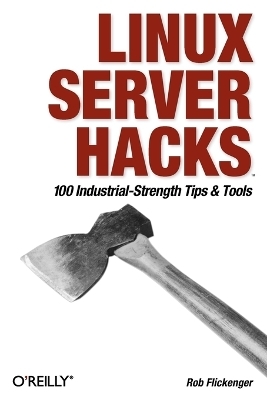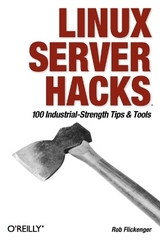Linux Server Hacks
O'Reilly Media (Verlag)
978-0-596-00461-3 (ISBN)
A competent system administrator knows that a Linux server is a high performance system for routing large amounts of information through a network connection. Setting up and maintaining a Linux server requires understanding not only the hardware, but the ins and outs of the Linux operating system along with its supporting cast of utilities as well as layers of applications software. There's basic documentation online but there's a lot beyond the basics you have to know, and this only comes from people with hands-on, real-world experience. This kind of "know how" is what we sought to capture in Linux Server Hacks. Linux Server Hacks is a collection of 100 industrial-strength hacks, providing tips and tools that solve practical problems for Linux system administrators. Every hack can be read in just a few minutes but will save hours of searching for the right answer. Some of the hacks are subtle, many of them are non-obvious, and all of them demonstrate the power and flexibility of a Linux system. You'll find hacks devoted to tuning the Linux kernel to make your system run more efficiently, as well as using CVS or RCS to track the revision to system files.
You'll learn alternative ways to do backups, how to use system monitoring tools to track system performance and a variety of secure networking solutions. Linux Server Hacks also helps you manage large-scale Web installations running Apache, MySQL, and other open source tools that are typically part of a Linux system. O'Reilly's new Hacks Series proudly reclaims the term "hacking" for the good guys. Hackers use their ingenuity to solve interesting problems. Rob Flickenger is an experienced system administrator, having managed the systems for O'Reilly Network for several years. (He's also into community wireless networking and he's written a book on that subject for O'Reilly.) Rob has also collected the best ideas and tools from a number of other highly skilled contributors. Written for users who already understand the basics, Linux Server Hacks is built upon the expertise of people who really know what they're doing.
Rob Flickenger has been a professional systems administrator for more than 10 years, and all around hacker for as long as he can remember. Rob enjoys spreading the good word of open networks, open standards, and ubiquitous wireless networking. His current professional project is Metrix Communication LLC, which provides wireless hardware and software that embodies the same open source principles he rants about in his books. Rob also works with the U.N. and various international organizations to bring these ideas to places where communications infrastructure is badly needed. He hopes that all of this effort is contributing toward the ultimate goal of infinite bandwidth everywhere for free. He is the author of Linux Server Hacks, Wireless Hacks, and Building Wireless Community Networks (which is in its second edition).
How to Become a Hacker Preface Server Basics 1. Removing Unnecessary Services 2. Forgoing the Console Login 3. Common Boot Parameters 4. Creating a Persistent Daemon with init 5. Swap Standard Output and Standard Error 6. Building Complex Command Lines 7. Working with Tricky Files in xargs 8. Immutable Files in ext2/ext3 9. Speeding Up Compiles 10. At Home in Your Shell Environment 11. Finding and Eliminating setuid/setgid Binaries 12. Make sudo Work Harder 13. Using a Makefile to Automate Admin Tasks 14. Brute Forcing Your New Domain Name 15. Playing Hunt the Disk Hog 16. Fun with /proc 17. Manipulating Processes ymbolically with procps 18. Managing System Resources per Process 19. Cleaning Up after Ex-Users 20. Eliminating Unnecessary Drivers from the Kernel 21. Using Large Amounts of RAM 22. hdparm: Fine Tune IDE Drive Parameters Revision Control 23. Getting Started with RCS 24. Checking Out a Previous Revision in RCS 25. Tracking Changes with rcs2log 26. Getting Started with CVS 27. CVS: Checking Out a Module 28. CVS: Updating Your Working Copy 29. CVS: Using Tags 30. CVS: Making Changes to a Module 31. CVS: Merging Files 32. CVS: Adding and Removing Files and Directories 33. CVS: Branching Development 34. CVS: Watching and Locking Files 35. CVS: Keeping CVS Secure 36. CVS: Anonymous Repositories Backups 37. Backing Up with tar over ssh 38. Using rsync over ssh 39. Archiving with Pax 40. Backing Up Your Boot Sector 41. Keeping Parts of Filesystems in sync with rsync 42. Automated Snapshot-Style Incremental Backups with rsync 43. Working with ISOs and CDR/CDRWs 44. Burning a CD Without Creating an ISO File Networking 45. Creating a Firewall from the Command Line of any Server 46. Simple IP Masquerading 47. iptables Tips & Tricks 48. Forwarding TCP Ports to Arbitrary Machines 49. Using Custom Chains in iptables 50. Tunneling: IPIP Encapsulation 51. Tunneling: GRE Encapsulation 52. Using vtun over ssh to Circumvent NAT 53. Automatic vtund.conf Generator Monitoring 54. Steering syslog 55. Watching Jobs with watch 56. What's Holding That Port Open? 57. Checking On Open Files and Sockets with lsof 58. Monitor System Resources with top 59. Constant Load Average Display in the Titlebar 60. Network Monitoring with ngrep 61. Scanning Your Own Machines with nmap 62. Disk Age Analysis 63. Cheap IP Takeover 64. Running ntop for Real-Time Network Stats 65. Monitoring Web Traffic in Real Time with httptop SSH 66. Quick Logins with ssh Client Keys 67. Turbo-mode ssh Logins 68. Using ssh-Agent Effectively 69. Running the ssh-Agent in a GUI 70. X over ssh 71. Forwarding Ports over ssh Scripting 72. Get Settled in Quickly with movein.sh 73. Global Search and Replace with Perl 74. Mincing Your Data into Arbitrary Chunks (in bash) 75. Colorized Log Analysis in Your Terminal Information Servers 76. Running BIND in a chroot Jail 77. Views in BIND 9 78. Setting Up Caching DNS with Authority for Local Domains 79. Distributing Server Load with Round-Robin DNS 80. Runn
| Erscheint lt. Verlag | 25.2.2003 |
|---|---|
| Reihe/Serie | O'Reilly Ser. |
| Verlagsort | Sebastopol |
| Sprache | englisch |
| Einbandart | kartoniert |
| Themenwelt | Informatik ► Betriebssysteme / Server ► Unix / Linux |
| ISBN-10 | 0-596-00461-3 / 0596004613 |
| ISBN-13 | 978-0-596-00461-3 / 9780596004613 |
| Zustand | Neuware |
| Informationen gemäß Produktsicherheitsverordnung (GPSR) | |
| Haben Sie eine Frage zum Produkt? |
aus dem Bereich




